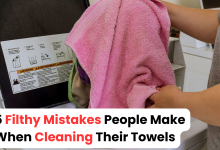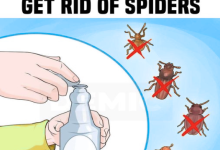Almost people try to disinfect their belongings day in and day out. But while you may think you’re doing things the right way, you could be using the wrong products or not using them correctly when it comes to disinfecting. To help you ensure you’re clearing properly, we’ve rounded up the top disinfecting tips from cleaning experts.
Get ready to rectify the common disinfecting mistakes you could be making.
1. You think cleaning and disinfecting are the same things.

Cleaning and disinfecting are two very different things, but many people get the two confused. “When you clean a space, you physically remove dirt and germs from surfaces or objects, such as your countertops,” says Vandana A. Patel, MD, clinical advisor for the online pharmacy Cabinet. “Disinfecting a space means you actually kill the germs in your space. Just because a space appears clean doesn’t mean it’s disinfected. Cleaning a surface and physically removing germs is helpful, but disinfecting is a better option to ensure you kill germs and to prevent the spread of viruses.”
2. You’re not using the correct products.

What differentiates disinfecting from cleaning? The type of products you’re using. According to Patel, disinfecting a space requires the use of “specific products to kill germs that are living on surfaces, rather than just physically removing them.” The United States Environmental Protection Agency (EPA) has created a list of products that meet their requirements for disinfecting for SARS-CoV-2, the virus that causes COVID-19, including Windex Disinfectant Cleaner, Comet Disinfecting Bathroom Cleaner, Clorox Disinfecting Wipes, and Lysol Disinfecting Wipes.
3. You’re wiping away disinfectants too soon.

Spraying a disinfectant and immediately wiping it off is most likely getting you nowhere, explains Jennifer Walden, WikiLawn Lawn Care’s director of operations. “You might catch some surface bacteria, but anything deeper will linger,” she says. “Read the label and see how long you need to wait. Most chemical disinfectants take about 10 minutes to activate.”
4. You’re making your own disinfectant wrong.

With cleaning supplies shortages across the country due to coronavirus, many people are creating their own homemade disinfecting products instead. If you’re DIY-ing disinfectants, you need to be fully aware of both expiration dates and what you’re mixing, as combining the wrong ingredients could make your cleaning agent ineffective or worse, dangerous, says Jennifer Rodriguez, director of business development for Pro Housekeepers.
“As people create their own solutions, they do not keep track of the expiration of certain chemicals or worse, they only top off old solutions with newly bought ingredients,” she says. “It is essential to create new bottles with new products as they are bought and to always keep track of expiration dates, avoiding mixing old solutions and new ones.”
5. You’re not taking caution when using bleach.

Bleach is one of the most effective and straightforward disinfectants out there, but not everyone knows how to properly use it. If you “have asthma, chronic obstructive pulmonary disease (COPD), or other chronic respiratory issues,” you should not use bleach, says Samantha Radford, Ph.D., exposure scientist and founder of The Evidence-Based Mommy.
And if you don’t fall into any of those categories, “you should work with bleach in a ventilated area and use gloves,” she recommends. “You should also store any bleach-containing cleaners out of reach of children. And never mix bleach with anything other than water—not vinegar, not ammonia, or anything else.”
6. You’re not washing your hands before and after disinfecting.

You’re not off the hook from hand-washing just because you’re “cleaning.” Justin Carpenter, owner of Texas-based home cleaning and maid service Modern Maids, says you need to wash your hands before and after you finish disinfecting your home, as “you don’t want to bring the virus into a clean environment.” He recommends washing your hands prior to disinfecting, wearing latex gloves during cleaning, and then washing your hands once more after the job is done.
7. You’re too focused on disinfecting your entire home every day.

If you’re thinking that disinfecting your entire home every day is a daunting task, you’re not wrong. Carpenter says that many people make the mistake of trying to “frequently disinfect their entire homes,” which can lead to sloppy work that doesn’t actually disinfect or leads to missed spots.







